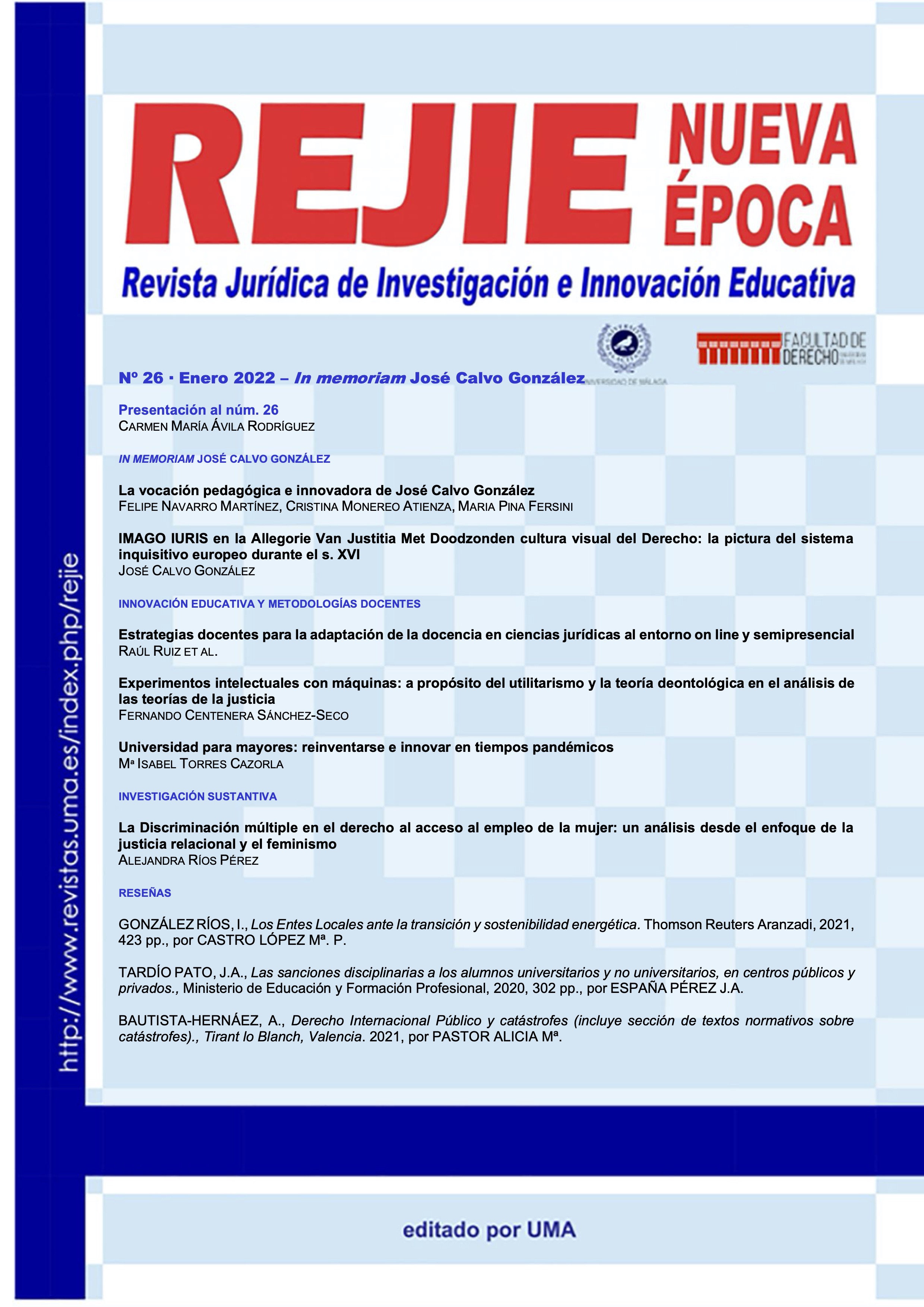Intellectual experiments with machines: on utilitarianism and deontological theory in the analysis of justice theories
DOI:
https://doi.org/10.24310/rejie.vi26.14130Keywords:
Philosophy of Law, utilitarianism, deontological theory, intellectual experiments, reflection, critical thinking.Abstract
This paper describes a teaching innovation experience implemented in the subject Philosophy of Law, based on the content taught on utilitarianism and deontological theory. The objectives were, amongst others, to clarify the content, provide lasting learning, and prompt reflection and critical thinking in students. The actions were mainly carried out in the practical sphere, using situations depicted in film scenes in which technological advances pose various dilemmas. Students were asked to diagnose these circumstances, identify the theory or theories of justice at play in them, and take a position. This exercise gave rise to various criticisms of the theories of justice in question; the students had to verify these objections, which thus became part of the subject’s content. The results obtained were generally satisfactory, as confirmed by a subsequent student survey. The level of achievement of the defined objectives suggests that the actions should continue to be implemented in future, offering the opportunity to improve them with other aspects that could help complete the training.
Downloads
Metrics
References
CABELLOS CASTILLA, M.ª R., CASTILLO GARCÍA, G. S., TORNÉ VALLE, E. (2007), “¿Para qué y cómo innovar en el aula universitaria?”, en Margalef García, L., Torné Valle, E. (eds.): Estrategias de innovación docente para favorecer el aprendizaje autónomo de los estudiantes de la Universidad de Alcalá. Alcalá de Henares: Servicio de Publicaciones. Universidad de Alcalá.
FARIÑAS, Mª. J. (2000), “El conocimiento científico del Derecho”, en Peces-Barba, G., Fernández, E., de Asís, R.: Curso de Teoría del Derecho. Madrid: Marcial Pons, segunda edición.
GARCÍA SAN MIGUEL, L. (2003), Los fundamentos del Derecho (penúltimos apuntes). Madrid: Dykinson.
GARRIDO GÓMEZ, M.ª I. (2013), “La innovación en la docencia y el aprendizaje de la Filosofía del Derecho por medio del método de casos”, REJIE: Revista Jurídica de Investigación e Innovación Educativa, 8, pp. 25-42, [en línea] https://revistas.uma.es/index.php/rejienuevaepoca/article/view/7749/7263.
IRACHETA FERNÁNDEZ, F. (2012), “Sobre dignidad y eutanasia voluntaria: tres aproximaciones morales (II parte)”, Límite. Revista de Filosofía y Psicología, 25, pp. 25-39, [en línea] https://www.redalyc.org/pdf/836/83624079003.pdf.
JONES, D. (dir.) (2011), Código fuente. Vendôme International.
MARGALEF GARCÍA, L. ([s. d.]), Estrategias metodológicas. [Alcalá de Henares]: Vicerrectorado de Planificación Académica y Profesorado. Dirección de Formación del Profesorado Universitario. Universidad de Alcalá. [Dosier].
NOZICK, R. (1974), Anarquía, Estado y utopía. México: Fondo de Cultura Económica.
RUIZ RESA, J. D. (2017), Innovación docente y nuevas tecnologías. El derecho en la economía del aprendizaje. Valencia: Tirant lo Blanch.
SÁNCHEZ MUÑOZ, J. M. (2018), “Informe sobre la película «Descifrando Enigma»”, Revista “Pensamiento Matemático”, VIII / 2, pp. 191-199, [en línea] https://dialnet.unirioja.es/servlet/articulo?codigo=6636704.
SANDEL, M. J. (2013), Justicia ¿Hacemos lo que debemos? Barcelona: Debolsillo.
TYLDUM, M. (dir.) (2015), The Imitation Game (Descifrando Enigma). Black Bear Pictures.
UNIVERSIDAD DE ALCALÁ (s. d.), Medidas de prevención COVID-19 Coronavirus. Protégete y protege a los demás. Universidad de Alcalá, [en línea] https://derecho.uah.es/facultad/documentos/medidas-prevencion-COVID.pdf.
UNIVERSIDAD DE ALCALÁ (s. d.), Plan de actuación de la Universidad de Alcalá para la adecuación de la actividad universitaria en el curso 2020-2021, [en línea] https://www.uah.es/export/sites/uah/.galleries/documentos/Plan-de-Actuacion_Curso-2020-2021.pdf.
WACHOWSKI, J. S., WACHOWSKI, L. (dir.) (1999), Matrix. Warner Bros.
WACHOWSKI, J. S., WACHOWSKI, L. (dir.) (2004), The Roots of the Matrix. Warner Bros.
ZAPATERO, V., GARRIDO GÓMEZ, M.ª I., ARCOS RAMÍREZ, F. (2010), El Derecho como proceso normativo. Lecciones de Teoría del Derecho. Alcalá de Henares: Servicio de Publicaciones. Universidad de Alcalá, 2ª edición.
Additional Files
Published
How to Cite
Issue
Section
License
Sin perjuicio de lo dispuesto en el Texto Refundido de la Ley de Propiedad Intelectual, aprobado por Real Decreto Legislativo 1/1996, de 12 de abril, y conforme al mismo, los autores/as ceden a título gratuito, de modo no exclusivo y sin límite temporal los derechos para difundir, reproducir, comunicar y distribuir, en cualquier formato actual o futuro (papel o electrónico), a la Universidad de Málaga (UMA), a fin de que sea publicado en REJIE Nueva Época.
Al realizar el envío, el autor declara que el contenido esencial del mismo no ha sido publicado ni se va a publicar en ninguna otra obra o revista mientras esté en proceso de evaluación en REJIE Nueva Época, comprometiéndose en todo caso a comunicar de inmediato al equipo editorial de la revista cualquier proyecto de publicación de dicho texto, y citando expresamente a la revista en el nuevo proyecto.
Todos los contenidos publicados por REJIE Nueva Época están sujetos a la licencia de Creative Commons Reconocimiento 4.0 Internacional, cuyo texto completo se puede consultar en https://creativecommons.org/licenses/by/4.0/legalcode
Conforme a la misma, se permite la copia, distribución, comunicación pública, obras derivadas y el uso comercial de los contenidos siempre que la fuente y el autor del texto sean citados Así, cuando el autor/a envía su colaboración está explícitamente aceptando esta cesión de derechos de edición y de publicación.
Es responsabilidad de los autores obtener los permisos necesarios de las imágenes que están sujetas a derechos de autor.







20.png)
